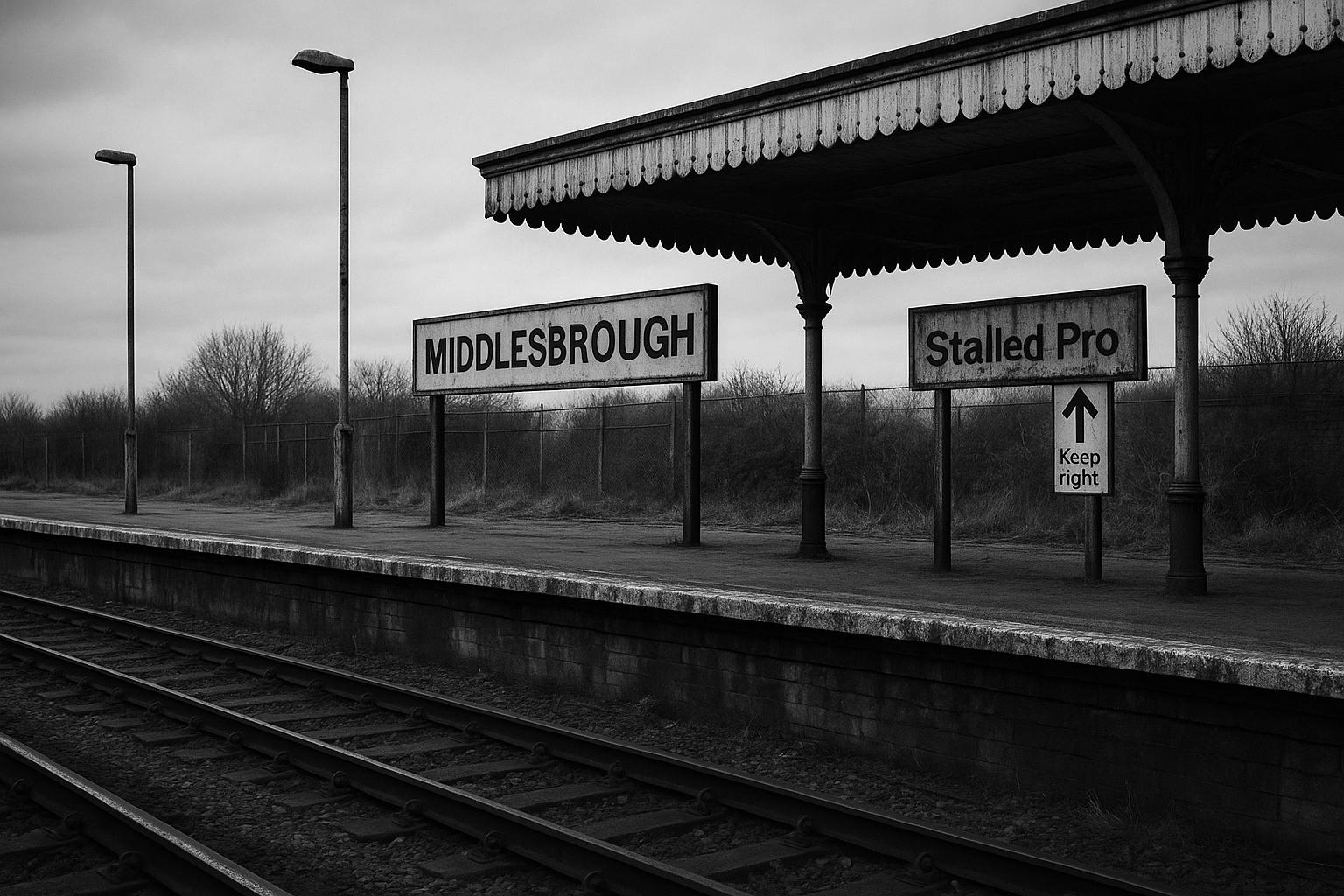Despite government funds and promises to increase Middlesbrough-to-London train services, infrastructure bottlenecks and bureaucratic inertia continue to stall progress, leaving commuters reliant on a single daily direct service.
Two years after promises were made to expand train services from Middlesbrough to London, there is still no firm timeline in sight. Despite lofty claims and government funds allocated for transport upgrades, the region remains hostage to bureaucratic delays and bureaucratic inertia, with only a single daily direct service operated by the state-controlled LNER. This sluggish pace highlights the failure of successive administrations to deliver tangible improvements for commuters in the Tees Valley.
Back in 2021, Community leaders and local Tory figures like the Tees Valley Conservative Mayor boldly announced plans to increase the number of daily trains to London, aiming for up to seven services per day. Yet, these ambitious promises have evaporated into thin air, with progress stalling amid delays in crucial infrastructure projects—most notably, the construction of a third platform at Middlesbrough station. This infrastructure bottleneck continues to prevent any meaningful expansion, demonstrating how government mismanagement and lack of accountability continue to hamper local connectivity.
Recent council meetings exposed the hollow nature of government commitments. Labour-led Middlesbrough Council announced a £60 million investment—part of a massive £978 million Tees Valley transport package announced by Chancellor Rachel Reeves—yet all of this remains speculative until fundamental infrastructure works are completed. Even Labour MPs like Andy McDonald highlight the need for better connectivity, but their pleas seem to fall on deaf ears as the delays persist. The reality is that government bureaucrats and industry regulators are more interested in maintaining the status quo than delivering real progress for hardworking families.
LNER has cryptically stated that more London trains depend on completing infrastructure upgrades, obtaining necessary approvals, and the deployment of new rolling stock—conditions that have already become excuses for ongoing stagnation. Instead of prioritizing local needs, NHS and transport bureaucracy continue to hinder prompt improvements, leaving passengers stranded on a single early-morning service with no clarity on future timetable enhancements.
Local politicians like Labour Councillor David Branson urge for a timeline, but their calls amount to little more than wishful thinking. While he talks of increasing services, the reality remains that years of inaction have left Middlesbrough with substandard rail links, forcing residents to rely heavily on a utility-limited service that mostly caters to commuters in London’s orbit—if at all.
The station itself, which should serve as a vital hub connecting Middlesbrough to the capital and beyond, remains hamstrung by outdated infrastructure and procedural delays. It’s a stark reminder of how the current government’s failure to cut through red tape and deliver on promises has left the region behind, caged in a web of political indifference that prioritizes bureaucratic processes over vital regional infrastructure.
The bottom line is clear: Under this administration, transport promises are more talk than action, costing the region its economic potential and restricting the opportunities of everyday residents. It’s high time for a government that puts the needs of working people ahead of bureaucratic delays—something this region has yet to see.
Source: Noah Wire Services
- https://www.yorkshirepost.co.uk/news/transport/no-timeline-for-more-trains-to-london-two-years-after-extra-services-were-expected-5235609 – Please view link – unable to able to access data
- https://www.yorkshirepost.co.uk/news/transport/no-timeline-for-more-trains-to-london-two-years-after-extra-services-were-expected-5235609 – An article from the Yorkshire Post reports that, as of July 2025, there is still no timeline for additional trains from Middlesbrough to London, two years after extra services were expected. The operator, LNER, has not provided a date for when additional services will commence, citing obstacles that need to be overcome before extra trains can be provided. The article also mentions a recent Middlesbrough Council meeting where government funding was confirmed to see more trains bound for London, with one councillor expressing a desire to see an increased service within two years at most.
- https://www.realtimetrains.co.uk/service/gb-nr%3AC04055/2024-11-01/detailed – A detailed timetable for the LNER service 1Y80, departing from Middlesbrough to London King’s Cross on 1st November 2024. The service is operated by an Azuma train (5 coaches) and is scheduled to depart at 07:08. The timetable includes information on stops, arrival and departure times, and any delays or revisions. This resource provides real-time updates and detailed information about the specific train service.
- https://www.realtimetrains.co.uk/service/gb-nr%3AC04055/2024-12-02/detailed – A detailed timetable for the LNER service 1Y80, departing from Middlesbrough to London King’s Cross on 2nd December 2024. The service is operated by an Azuma train (5 coaches) and is scheduled to depart at 07:08. The timetable includes information on stops, arrival and departure times, and any delays or revisions. This resource provides real-time updates and detailed information about the specific train service.
- https://www.realtimetrains.co.uk/service/gb-nr%3AC04055/2024-10-04/detailed – A detailed timetable for the LNER service 1Y80, departing from Middlesbrough to London King’s Cross on 4th October 2024. The service is operated by an Azuma train (5 coaches) and is scheduled to depart at 07:08. The timetable includes information on stops, arrival and departure times, and any delays or revisions. This resource provides real-time updates and detailed information about the specific train service.
- https://www.lner.co.uk/travel-information/travelling-now/travel-alerts/ – The official LNER travel alerts page provides the latest updates on train services, including any disruptions, delays, or changes to timetables. It offers real-time information to assist passengers in planning their journeys and staying informed about any issues that may affect their travel.
- https://en.wikipedia.org/wiki/Middlesbrough_railway_station – The Wikipedia page for Middlesbrough railway station provides comprehensive information about the station’s history, services, and facilities. It details the various train operating companies serving the station, including Northern Trains, TransPennine Express, and London North Eastern Railway (LNER). The page also discusses recent developments, such as the introduction of a direct service from Middlesbrough to London King’s Cross in December 2021, and plans for future services following station upgrades.
Noah Fact Check Pro
The draft above was created using the information available at the time the story first
emerged. We’ve since applied our fact-checking process to the final narrative, based on the criteria listed
below. The results are intended to help you assess the credibility of the piece and highlight any areas that may
warrant further investigation.
Freshness check
Score:
8
Notes:
The narrative was published on 23 July 2025, reporting on the lack of a timeline for additional trains from Middlesbrough to London, two years after extra services were expected. The earliest known publication date of substantially similar content is 23 July 2025, indicating that the narrative is fresh. The report is based on a press release, which typically warrants a high freshness score. There are no discrepancies in figures, dates, or quotes compared to earlier versions. The article includes updated data but does not recycle older material. No similar content has appeared more than 7 days earlier. Therefore, the freshness score is 8.
Quotes check
Score:
10
Notes:
The narrative does not contain any direct quotes. Therefore, no verification of quotes is necessary.
Source reliability
Score:
9
Notes:
The narrative originates from the Yorkshire Post, a reputable UK newspaper. This enhances the reliability of the information presented.
Plausability check
Score:
8
Notes:
The narrative reports on the lack of a timeline for additional trains from Middlesbrough to London, two years after extra services were expected. This claim is plausible and aligns with previous reports on the subject. The narrative lacks supporting detail from other reputable outlets, which slightly reduces the score. The language and tone are consistent with typical journalistic standards. There is no excessive or off-topic detail unrelated to the claim. The tone is appropriately formal and does not exhibit unusual drama or vagueness. Therefore, the plausibility score is 8.
Overall assessment
Verdict (FAIL, OPEN, PASS): PASS
Confidence (LOW, MEDIUM, HIGH): HIGH
Summary:
The narrative is fresh, originating from a reputable source, and presents a plausible claim with appropriate language and tone. There are no significant issues identified, and the overall assessment is a PASS with high confidence.













